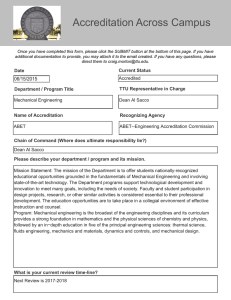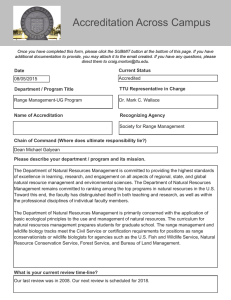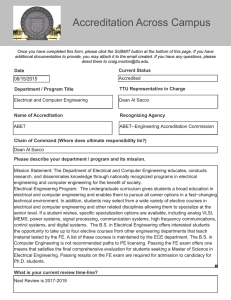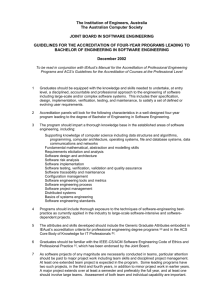Accreditation Across Campus
advertisement
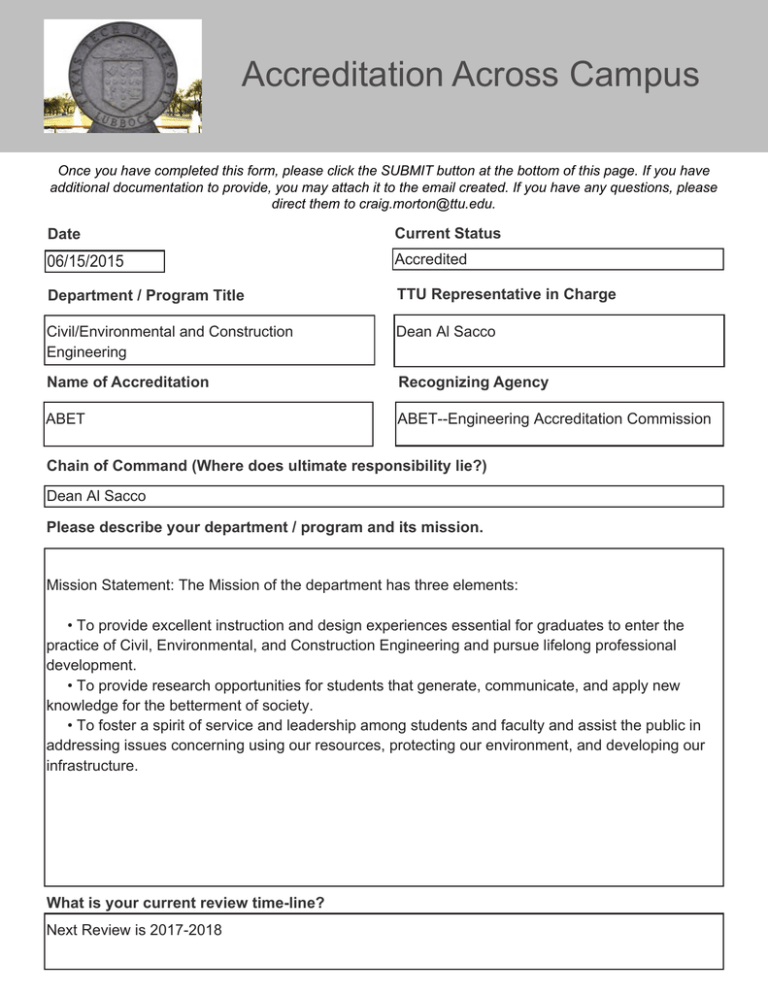
Accreditation Across Campus 2QFH\RXKDYHFRPSOHWHGWKLVIRUPSOHDVHFOLFNWKH68%0,7EXWWRQDWWKHERWWRPRIWKLVSDJH,I\RXKDYH DGGLWLRQDOGRFXPHQWDWLRQWRSURYLGH\RXPD\DWWDFKLWWRWKHHPDLOFUHDWHG,I\RXKDYHDQ\TXHVWLRQVSOHDVH GLUHFWWKHPWRFUDLJPRUWRQ#WWXHGX Date Current SWDWXV 06/15/2015 Accredited Department / Program Title TTU Representative in Charge Civil/Environmental and Construction Engineering Dean Al Sacco Name of Accreditation Recognizing Agency ABET ABET--Engineering Accreditation Commission Chain of Command (Where does ultimate responsibility lie?) Dean Al Sacco Please describe your department / program and its mission. Mission Statement: The Mission of the department has three elements: • To provide excellent instruction and design experiences essential for graduates to enter the practice of Civil, Environmental, and Construction Engineering and pursue lifelong professional development. • To provide research opportunities for students that generate, communicate, and apply new knowledge for the betterment of society. • To foster a spirit of service and leadership among students and faculty and assist the public in addressing issues concerning using our resources, protecting our environment, and developing our infrastructure. What is your current review time-line? Next Review is 2017-2018 Additional notes regarding current standing: Environmental Engineering Program: Environmental engineering is focused on the prevention and remediation of air, water, and soil contamination problems to reduce the risks to human health, water resources, and ecosystems. Environmental engineering is a discipline that evolved from civil engineering and includes aspects of the sciences (biology, chemistry, and geosciences). Professional opportunities exist in consulting engineering firms, in industries with significant environmental compliance challenges, and in governmental regulatory agencies. Environmental engineers apply physical, chemical, and biological processes in systems that remove and/or destroy pollutants in water, air, and soils and that reduce non-hazardous solid waste volumes. Specific assignments include provision for safe drinking water, treatment and disposal of municipal wastewaters, treatment and management of storm run-off, management of solid and hazardous wastes, and cleaning sites contaminated by hazardous materials. Burgeoning national and global population growth will continue to exert demands for clean water, clean air, and environmentally sound disposal of waste materials. These demands will require the comprehensive knowledge and skills of environmental engineers to plan, design, and operate systems to achieve these goals efficiently and economically. The engineer's role is vital in helping to both detect and identify the potential environmental problems, to implement procedures to correct these potential and existing problems, and to work to improve the quality of life in the 21st century. Civil Engineering Program: The four-year B.S.C.E. degree program prepares graduates to enter the professional practice of Civil Engineering. The program imparts essential knowledge, tools and skills necessary for Civil Engineering graduates to become successful engineers and life-long learners. Graduates gain the ability to understand and apply mathematics, science and engineering science to solve engineering problems. They have the ability to design modern engineering systems, to work on multidisciplinary teams and to communicate by written and graphical means. Undergraduates have the opportunity for research experience by working on the many research projects conducted by the department. The program strives to instill a spirit of service and leadership among the students. Development of leadership skills, awareness of professional ethics, Explanation for not pursXing accreditation: and participation in student organizations prepare the B.S.C.E. graduate for professional practice. Many graduates continue their education by obtaining a M.S.C.E., MBA and/or Ph.D. Construction Engineering Program: Construction Engineers are concerned with planning and managing construction sequences and operations, estimating and managing construction costs and cash flow, managing quality control of the materials and construction processes, designing temporary structures, controlling building geometry, maintaining site safety and site layout, and controlling material procurement and storage. Projects that these engineers manage include; highways, bridges, hospitals, commercial buildings, schools, power generation plants, dams, and offshore drilling platforms. The construction engineering program at Texas Tech prepares students for job duties that emphasize the application of engineering knowledge to the solution of practical construction problems. The four-year Bachelor of Science in Construction Engineering is a broad based curriculum designed to prepare its graduates to enter into a wide range of positions in the construction industry. It is composed of 128 semester credit hours of course work, including a required internship. Note: If the "Submit by Email" function does not work, save to a PDF file and email file to Craig Morton at craig.morton@ttu.edu
